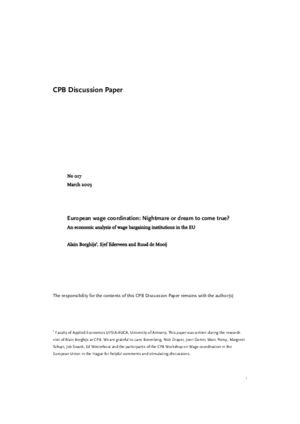European wage coordination; nightmare or dream to come true? An economic analysis of wage bargaining institutions in the EU
Europese looncoördinatie kan grote gevolgen hebben
We are sorry, unfortunately there is no English translation of this page.
This paper analyses recent trends in wage bargaining institutions in Europe to explain the gradual deterioration in the bargaining position of trade unions. It appears that the integration of European economies is an important factor.
This raises the question whether trade unions will respond by coordinating their wages internationally. Our conjecture is that the opportunities for wage coordination are not very strong. This is because of the numerous obstacles associated with heterogenous structures in wage setting in the EU. Softer coordination, e.g. in the form of information exchange or agreements on common rules in wage setting, is more likely to occur and has already been introduced in some cases.
If stronger forms of international wage coordination would take off, perhaps in the longer term, this would strengthen the bargaining power of trade unions relative to firms. The implications for equilibrium unemployment are ambiguous. On the one hand, higher bargaining power raises wages and thereby unemployment. On the other hand, it reduces unemployment by better incorporating the response of the ECB to wage demands. Another consequence of stronger forms of international wage coordination may be that the absorption of asymmetric shocks in the EMU gets more problematic. In that case, wage coordination may turn into a nightmare as it hampers a crucial stabilisation mechanism in the EMU.
